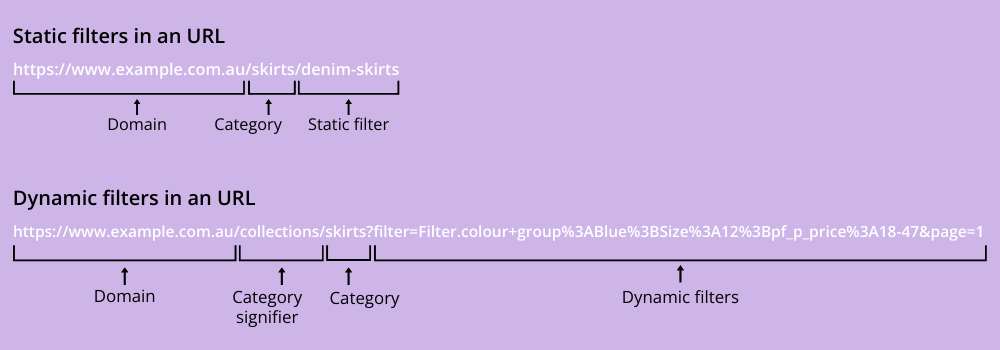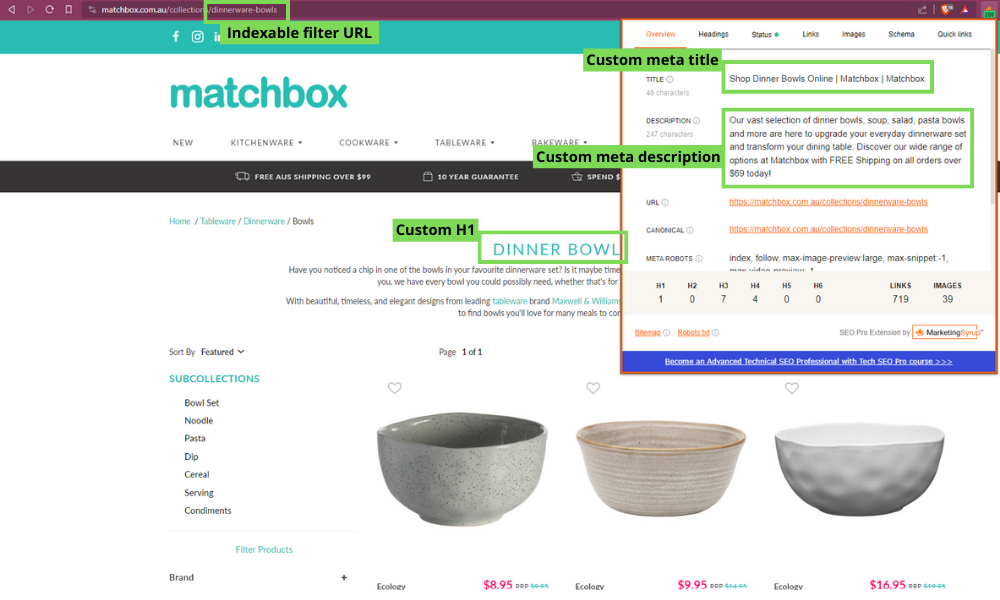Shopify’s URL structure & Megantic’s custom code
14 November 2023 Blog Posts
In this blog, we will explore the nuances of Shopify’s URL structure compared to other eCommerce platforms and dive into the custom code developed by our team to optimise it.
In the ever-evolving landscape of eCommerce, Shopify stands out as a popular choice for online businesses. Its user-friendly interface, extensive feature set, and robust ecosystem have made it a go-to platform for countless merchants. One key aspect that often goes unnoticed but plays a pivotal role in the success of an eCommerce website is the URL structure.
Shopify URLs vs. URLs for Other eCommerce Platforms
URLs on Shopify are typically dynamic, meaning they change with various user interactions, such as selecting filters like colour or size. These dynamic URLs are characterised by a question mark (?) followed by a string of text or numbers. Unfortunately, these dynamic URLs pose a significant challenge for SEO and visibility in search engine rankings. Google tends to prefer static, indexable pages, as they provide a more consistent and reliable user experience.

The problem with dynamic URLs is that they are not perceived as “real” pages by Google. As a result, they often don’t rank well in search results, and businesses miss out on potential customers landing on those pages. In essence, they become hidden corners of the website, largely invisible to the search engine and, consequently, potential customers.
Shopify’s native functionality does not offer an out-of-the-box solution to create static filters utilising tags. This limitation prompted our team to create a custom code solution to tackle this challenge head-on. Our developers worked diligently to bridge the gap between Shopify’s dynamic URLs and the desire for static, SEO-friendly URLs.
Learn more about how to get URL structures right here.
Our Custom Code Solution to Improve Shopify’s URL Structure
Our developers’ custom code addresses several critical issues and provides solutions to enhance your eCommerce website’s performance. Here’s how it works:
Creating Static Selling Pages
With our custom code, we gain the ability to leverage tags to create static URLs. When filters, such as colour or size, are applied, instead of generating dynamic URLs, our code transforms them into static selling pages. These static pages serve as entry points for customers, offering more accessibility, and allow Google to index them, thereby improving your website’s visibility in search results.

Writing Custom Metadata in Shopify
Another advantage of our custom code is the ability to create custom metadata (SEO fields). This includes crafting unique page titles, meta descriptions, and H1 tags for each static selling page. This level of customisation is crucial for optimising your website’s SEO strategy and ensuring that your products appear in search results for relevant keywords.
Learn more about what is metadata or how to write descriptive metadata in detail.

Targeting Relevant Keywords
Our custom code empowers Shopify merchants to target more relevant keywords. By creating static selling pages with unique SEO elements, you can attract highly educated and ready-to-buy customers. These static pages become invaluable sales points of entry, catering to specific customer preferences and providing a superior user experience.
Our custom code for Shopify’s URL structure revolutionises the way Shopify merchants approach SEO and user experience. By converting dynamic URLs into static selling pages, optimising SEO fields, and targeting specific keywords, our solution not only enhances your website’s visibility in search results but also attracts a more informed and eager customer base.
In a competitive online marketplace, every advantage counts, and our custom code offers a strategic edge that can significantly impact your eCommerce success.
Contact us today to see if our custom Shopify code is right for you.





